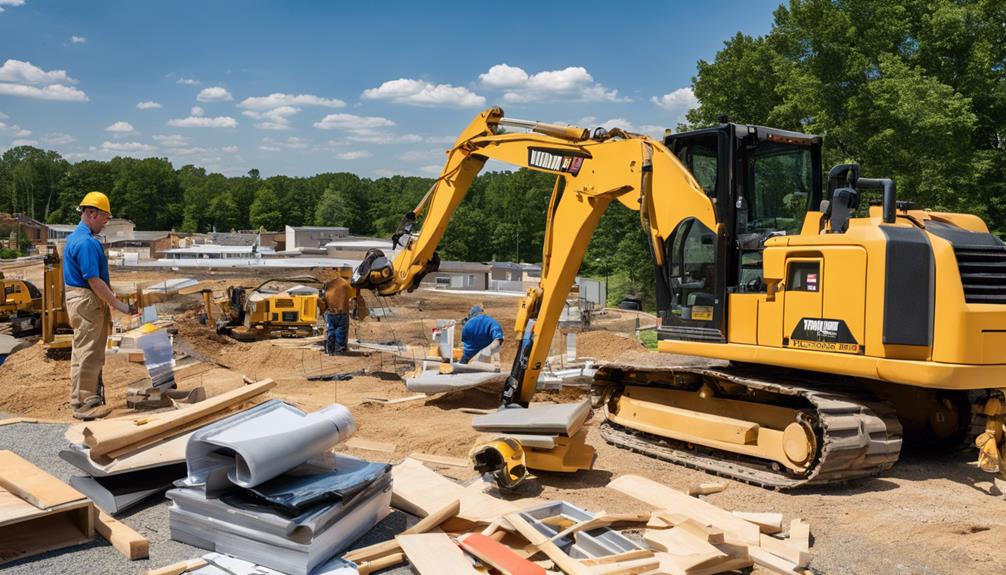If you're working as a mechanical contractor in Prince William County, VA, understanding the requirements for a Mechanical Contractor Bond is essential. This bond not only acts as a safeguard for your clients but also bolsters your professional credibility. You'll want to navigate the application process carefully, as various types of bonds exist that could impact your operations. But what specific challenges might you face in maintaining compliance, and how can you ensure that your bond works to your advantage?
What Is a Mechanical Contractor Bond?

A mechanical contractor bond is a crucial document that guarantees a contractor will adhere to local laws and regulations while completing their projects. This bond acts as a safety net for clients and the community, ensuring that contractors maintain professional standards and ethical practices.
When you hire a mechanical contractor, you're not just looking for someone skilled; you want assurance that your investment is protected. The bond serves as a financial guarantee that, if the contractor fails to meet their obligations, you can seek compensation.
It's also a way of holding them accountable for their work quality and compliance with industry standards. If issues arise—like incomplete work or violations of regulations—you can file a claim against the bond. This helps ensure the contractor addresses the problem or faces financial penalties.
In essence, a mechanical contractor bond fosters trust between you and the contractor. By requiring this bond, you're making sure they take their responsibilities seriously and are committed to delivering satisfactory results.
Whether you're a homeowner or a business, understanding the mechanics of this bond can help you make informed decisions about your projects.
Importance of the Bond
Understanding the significance of a mechanical contractor bond can greatly impact your decision-making process. This bond not only protects your clients but also enhances your credibility as a contractor. When you have a bond in place, it demonstrates your commitment to adhering to industry standards and regulations, including Michigan Surety Bonds.
Clients often feel more secure knowing you're bonded, which can lead to more opportunities and contracts. Moreover, a mechanical contractor bond serves as a financial safety net. If you fail to meet your contractual obligations, your clients can file a claim against the bond, ensuring they're compensated for any losses incurred. This protection helps you maintain a good reputation in the industry.
Additionally, many jurisdictions, including Prince William County, require contractors to have a bond to operate legally. This means that by securing a bond, you're not only complying with local regulations but also positioning yourself as a reliable and responsible professional.
Ultimately, investing in a mechanical contractor bond can lead to increased trust, better business relationships, and a stronger foundation for your contracting career. So, don't underestimate its importance; it's a crucial step in building your business's reputation and success.
Bonding Requirements in Virginia

In Virginia, bonding requirements for mechanical contractors are essential for operating legally and maintaining a professional standing. To begin, you must secure a surety bond, which acts as a financial guarantee that you'll adhere to state regulations and fulfill contractual obligations. This bond protects clients from potential losses due to your failure to meet industry standards or complete projects as promised.
In addition, understanding various types of bonds can be crucial, as they can differ significantly by state, such as the Louisiana Surety Bonds that ensure compliance with local regulations.
The specific bond amount in Virginia may vary depending on the scope of work and local regulations. It's crucial to research your particular area, as some jurisdictions have different requirements. Additionally, you should ensure that your bond is issued by a licensed surety company. This ensures that the bond is valid and recognized by the state.
When you obtain a mechanical contractor bond, you demonstrate your commitment to professionalism and compliance with laws. This not only builds trust with clients but also enhances your reputation in the industry.
How to Apply for a Bond
Applying for a bond can seem daunting, but breaking it down into manageable steps makes the process smoother. First, gather the necessary documentation. You'll typically need proof of your business license, financial statements, and any relevant project details.
It's essential to have your paperwork organized, as this speeds up the process. Additionally, understanding the specific requirements and regulations associated with your industry can further streamline your application.
Next, research bonding companies that operate in Prince William County. Look for firms with a solid reputation, and compare their rates and services.
Once you've chosen a company, reach out to them for a quote. They'll evaluate your credentials and determine your bond premium.
After receiving a quote, carefully review the terms and conditions. If everything looks good, you'll need to fill out a bond application. Be prepared to provide any additional information they require, like your work history or credit score.
Once you submit your application, the bonding company will assess your risk level before issuing the bond. If approved, you'll receive the bond document, which you'll need to submit to the appropriate county office.
Types of Mechanical Contractor Bonds

Mechanical contractor bonds come in various types, each serving a specific purpose in the construction industry. One common type is the performance bond, which guarantees that you'll complete the project according to the contract terms. If you fail to meet these obligations, the bond protects the project owner by providing financial compensation.
Another type is the payment bond. This bond ensures that you'll pay all your subcontractors and suppliers on time. If you don't, the bond guarantees payment, preventing potential liens against the property.
You might also encounter a license bond. Many jurisdictions require this bond to ensure that you comply with local laws and regulations. It helps to protect the public by ensuring you're operating within legal frameworks.
Lastly, there are maintenance bonds, which cover the costs of repairing any defects in workmanship for a specified period after project completion. This reassures clients that they won't be left with unexpected repair bills.
Understanding these types of mechanical contractor bonds can help you choose the right one for your projects, ensuring you meet both legal requirements and client expectations.
Cost of the Bond
The cost of a mechanical contractor bond can vary significantly based on several factors, including the size of the project, the bond amount required, and your creditworthiness.
Typically, you can expect to pay a percentage of the total bond amount, often ranging from 1% to 3%. For instance, if you need a $100,000 bond, your premium might fall between $1,000 and $3,000.
Your credit score plays a crucial role in determining the exact rate you'll receive. If you have excellent credit, you'll likely secure a lower premium, while a lower score may lead to higher costs.
Additionally, the overall demand for bonds in your area and the specifics of the project can influence pricing.
Keep in mind that some surety companies might also consider your business experience, financial stability, and the nature of the work you intend to perform.
To ensure you're getting the best deal, shop around and compare quotes from multiple surety providers. This way, you'll find a bond that fits your budget while meeting the legal requirements for your mechanical contracting work in Prince William County.
Common Challenges Faced

Navigating the bond process can be challenging, especially when you encounter various regulations and requirements specific to Prince William County. One of the biggest hurdles you might face is understanding the specific documentation needed to secure your mechanical contractor bond. This process often involves gathering financial statements, proof of experience, and sometimes even letters of recommendation, which can feel overwhelming.
Additionally, you may run into issues with the application timeline. Delays can arise from incomplete submissions or bureaucratic red tape, pushing your project back and causing frustration. You might also find that the requirements change, which could lead to confusion and additional work on your part.
Another challenge includes the costs associated with the bond itself. While you might've budgeted for the bond premium, unexpected fees or higher-than-anticipated rates can strain your finances.
Lastly, understanding the legal language often found in bond agreements can be daunting. Misinterpretations could lead to compliance issues down the line.
Maintaining Bond Compliance
Maintaining bond compliance is crucial for ensuring your ability to operate as a mechanical contractor in Prince William County. To stay compliant, you need to understand the specific requirements outlined in your bond agreement.
Regularly review these terms and conditions to avoid any surprises down the line. It's essential to keep your licenses up to date and renew them as required. Failure to do so can jeopardize your bond status.
Additionally, stay informed about local regulations and industry standards, as these can change. Being proactive will help you avoid violations that could lead to penalties or claims against your bond.
Ensure that your financial records are organized and transparent. Your surety company may require documentation to confirm your financial stability.
Maintaining good credit and fulfilling your contractual obligations is also vital. If issues arise, communicate promptly with your surety to mitigate any potential problems.
Benefits of Being Bonded

Being bonded offers significant advantages for mechanical contractors in Prince William County. First and foremost, having a bond enhances your credibility. Clients and subcontractors are more likely to trust you if you're bonded, as it shows you're committed to adhering to industry standards and regulations. This trust can lead to more business opportunities.
Additionally, being bonded provides financial protection for your clients. In case of any issues like incomplete work or contract violations, your bond can cover their losses. This reassurance can set you apart from competitors who aren't bonded.
Moreover, being bonded can help you secure larger projects. Many organizations, especially government contracts, require contractors to be bonded. By meeting this requirement, you open doors to lucrative contracts that can significantly boost your revenue.
Lastly, the process of becoming bonded often involves a thorough evaluation of your business practices, which can help you identify areas for improvement. This not only strengthens your business but also enhances your reputation in the industry.
Resources for Contractors
What resources are available to help you thrive as a mechanical contractor in Prince William County?
First, consider the local contractor's association. Joining this group connects you with fellow professionals, providing networking opportunities, workshops, and valuable industry insights.
Another key resource is the Small Business Administration (SBA). They offer guidance on financing, business planning, and compliance with local regulations. Their online resources can help you understand the requirements for mechanical contracting in Virginia.
You should also explore online platforms like the Virginia Department of Professional and Occupational Regulation. They keep you updated on licensing requirements and changes in laws that could impact your business.
Local trade schools and community colleges are excellent resources for further training. They often provide specialized courses that can enhance your skills and keep you competitive.
Conclusion
In conclusion, securing a Mechanical Contractor Bond in Prince William County, VA, is essential for your business. It not only ensures compliance with local regulations but also builds trust with your clients. By understanding the bonding requirements and navigating the application process, you can protect your interests and foster successful client relationships. Remember, being bonded enhances your credibility and opens doors to more projects. So, take the necessary steps to get bonded and thrive in your contracting career!


